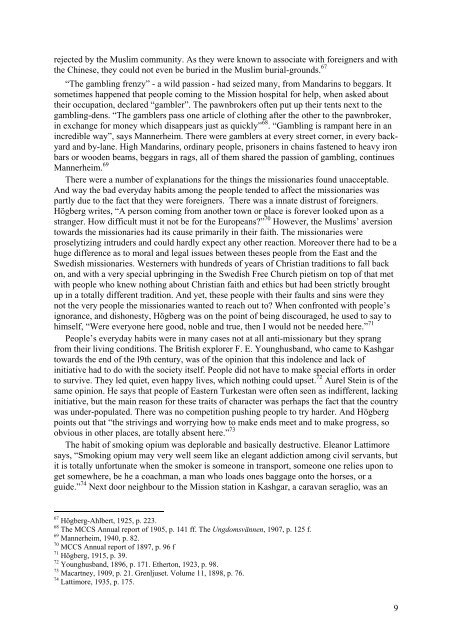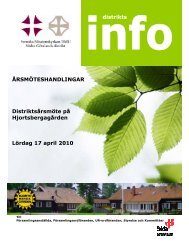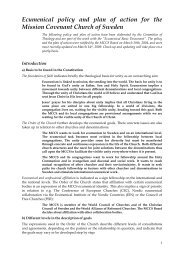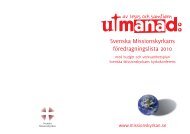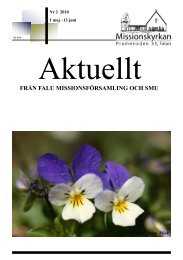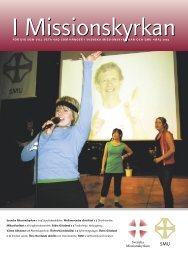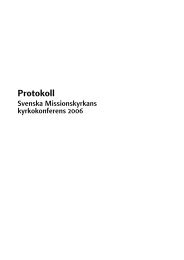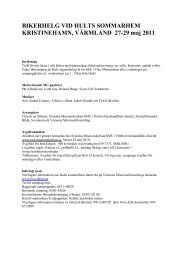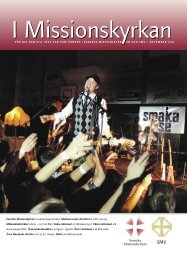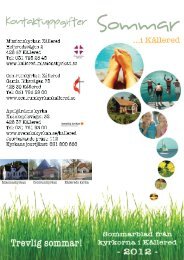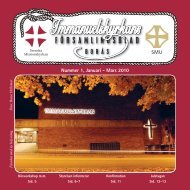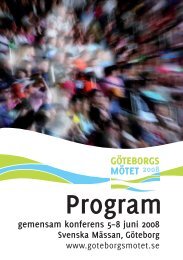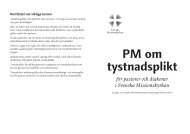Mission and Revolution in Central Asia - Svenska Missionskyrkan
Mission and Revolution in Central Asia - Svenska Missionskyrkan
Mission and Revolution in Central Asia - Svenska Missionskyrkan
You also want an ePaper? Increase the reach of your titles
YUMPU automatically turns print PDFs into web optimized ePapers that Google loves.
ejected by the Muslim community. As they were known to associate with foreigners <strong>and</strong> with<br />
the Ch<strong>in</strong>ese, they could not even be buried <strong>in</strong> the Muslim burial-grounds. 67<br />
“The gambl<strong>in</strong>g frenzy” - a wild passion - had seized many, from M<strong>and</strong>ar<strong>in</strong>s to beggars. It<br />
sometimes happened that people com<strong>in</strong>g to the <strong>Mission</strong> hospital for help, when asked about<br />
their occupation, declared “gambler”. The pawnbrokers often put up their tents next to the<br />
gambl<strong>in</strong>g-dens. “The gamblers pass one article of cloth<strong>in</strong>g after the other to the pawnbroker,<br />
<strong>in</strong> exchange for money which disappears just as quickly” 68 . “Gambl<strong>in</strong>g is rampant here <strong>in</strong> an<br />
<strong>in</strong>credible way”, says Mannerheim. There were gamblers at every street corner, <strong>in</strong> every backyard<br />
<strong>and</strong> by-lane. High M<strong>and</strong>ar<strong>in</strong>s, ord<strong>in</strong>ary people, prisoners <strong>in</strong> cha<strong>in</strong>s fastened to heavy iron<br />
bars or wooden beams, beggars <strong>in</strong> rags, all of them shared the passion of gambl<strong>in</strong>g, cont<strong>in</strong>ues<br />
Mannerheim. 69<br />
There were a number of explanations for the th<strong>in</strong>gs the missionaries found unacceptable.<br />
And way the bad everyday habits among the people tended to affect the missionaries was<br />
partly due to the fact that they were foreigners. There was a <strong>in</strong>nate distrust of foreigners.<br />
Högberg writes, “A person com<strong>in</strong>g from another town or place is forever looked upon as a<br />
stranger. How difficult must it not be for the Europeans?” 70 However, the Muslims’ aversion<br />
towards the missionaries had its cause primarily <strong>in</strong> their faith. The missionaries were<br />
proselytiz<strong>in</strong>g <strong>in</strong>truders <strong>and</strong> could hardly expect any other reaction. Moreover there had to be a<br />
huge difference as to moral <strong>and</strong> legal issues between theses people from the East <strong>and</strong> the<br />
Swedish missionaries. Westerners with hundreds of years of Christian traditions to fall back<br />
on, <strong>and</strong> with a very special upbr<strong>in</strong>g<strong>in</strong>g <strong>in</strong> the Swedish Free Church pietism on top of that met<br />
with people who knew noth<strong>in</strong>g about Christian faith <strong>and</strong> ethics but had been strictly brought<br />
up <strong>in</strong> a totally different tradition. And yet, these people with their faults <strong>and</strong> s<strong>in</strong>s were they<br />
not the very people the missionaries wanted to reach out to? When confronted with people’s<br />
ignorance, <strong>and</strong> dishonesty, Högberg was on the po<strong>in</strong>t of be<strong>in</strong>g discouraged, he used to say to<br />
himself, “Were everyone here good, noble <strong>and</strong> true, then I would not be needed here.” 71<br />
People’s everyday habits were <strong>in</strong> many cases not at all anti-missionary but they sprang<br />
from their liv<strong>in</strong>g conditions. The British explorer F. E. Younghusb<strong>and</strong>, who came to Kashgar<br />
towards the end of the l9th century, was of the op<strong>in</strong>ion that this <strong>in</strong>dolence <strong>and</strong> lack of<br />
<strong>in</strong>itiative had to do with the society itself. People did not have to make special efforts <strong>in</strong> order<br />
to survive. They led quiet, even happy lives, which noth<strong>in</strong>g could upset. 72 Aurel Ste<strong>in</strong> is of the<br />
same op<strong>in</strong>ion. He says that people of Eastern Turkestan were often seen as <strong>in</strong>different, lack<strong>in</strong>g<br />
<strong>in</strong>itiative, but the ma<strong>in</strong> reason for these traits of character was perhaps the fact that the country<br />
was under-populated. There was no competition push<strong>in</strong>g people to try harder. And Högberg<br />
po<strong>in</strong>ts out that “the striv<strong>in</strong>gs <strong>and</strong> worry<strong>in</strong>g how to make ends meet <strong>and</strong> to make progress, so<br />
obvious <strong>in</strong> other places, are totally absent here.” 73<br />
The habit of smok<strong>in</strong>g opium was deplorable <strong>and</strong> basically destructive. Eleanor Lattimore<br />
says, “Smok<strong>in</strong>g opium may very well seem like an elegant addiction among civil servants, but<br />
it is totally unfortunate when the smoker is someone <strong>in</strong> transport, someone one relies upon to<br />
get somewhere, be he a coachman, a man who loads ones baggage onto the horses, or a<br />
guide.” 74 Next door neighbour to the <strong>Mission</strong> station <strong>in</strong> Kashgar, a caravan seraglio, was an<br />
67<br />
Högberg-Ahlbert, 1925, p. 223.<br />
68<br />
The MCCS Annual report of 1905, p. 141 ff. The Ungdomsvännen, 1907, p. 125 f.<br />
69<br />
Mannerheim, 1940, p. 82.<br />
70<br />
MCCS Annual report of 1897, p. 96 f<br />
71<br />
Högberg, 1915, p. 39.<br />
72<br />
Younghusb<strong>and</strong>, 1896, p. 171. Etherton, 1923, p. 98.<br />
73<br />
Macartney, 1909, p. 21. Grenljuset. Volume 11, 1898, p. 76.<br />
74<br />
Lattimore, 1935, p. 175.<br />
9


